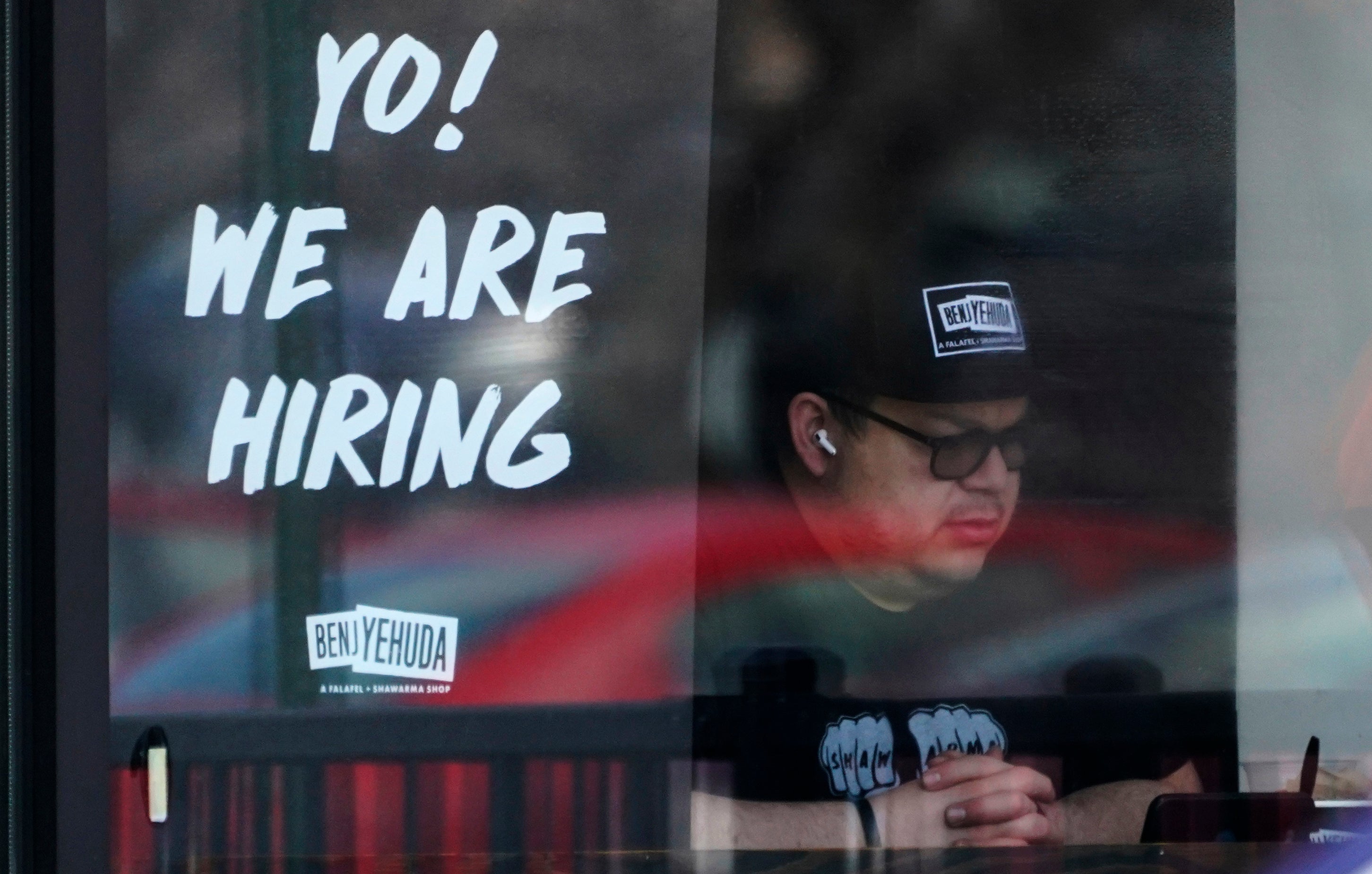US hiring was likely solid in June despite recession fears
U.S. employers likely downshifted their pace of hiring in June, but to a level that remains solid despite heightened fears that the economy faces the growing risk of a recession

Your support helps us to tell the story
From reproductive rights to climate change to Big Tech, The Independent is on the ground when the story is developing. Whether it's investigating the financials of Elon Musk's pro-Trump PAC or producing our latest documentary, 'The A Word', which shines a light on the American women fighting for reproductive rights, we know how important it is to parse out the facts from the messaging.
At such a critical moment in US history, we need reporters on the ground. Your donation allows us to keep sending journalists to speak to both sides of the story.
The Independent is trusted by Americans across the entire political spectrum. And unlike many other quality news outlets, we choose not to lock Americans out of our reporting and analysis with paywalls. We believe quality journalism should be available to everyone, paid for by those who can afford it.
Your support makes all the difference.U.S. employers likely downshifted their pace of hiring in June, but to a level that remains solid despite fears that the economy faces the growing risk of a recession.
On Friday, the Labor Department is expected to report that the nation gained 275,000 jobs last month, according to economists surveyed by the data provider FactSet. That would be the lowest monthly gain of the past year, during which the job market has sustained a vigorous recovery from the pandemic recession. Before the pandemic struck in early 2020, monthly hiring that large would have been seen as a robust gain.
The unemployment rate in June is thought to have remained at 3.6% for a fourth straight month, just above a 50-year low reached in 2019.
If the projections prove accurate, it will underscore the U.S. economy's unusual and seemingly contradictory circumstances. Growth has been negative for two straight quarters, consumers are slowing their spending with inflation at a four-decade high and home sales have fallen as the Federal Reserve has jacked up borrowing costs.
Yet many businesses are still scrambling to hire more people, with roughly two available jobs for every unemployed worker. And the number of people seeking unemployment benefits — a proxy for layoffs and an early indicator of a downturn — remains far below historic averages, although it has ticked up recently.
Still, hiring could weaken further in the coming months. The Fed wants job growth to slow, at least modestly, as part of its strenuous efforts to cool the economy and curb high inflation. The Biden administration, too, has sought to portray any pullback in hiring as part of a welcome transition to a more sustainable economy that will help keep inflation down.
Smaller monthly job increases “will be a sign that we are successfully moving into the next phase of recovery” that is “stable and steady,” a senior White House official said Thursday.
Yet the transition to a more sustainable pace of growth and hiring is likely to be a bumpy one. If, for example, the Fed's rate cuts end up slowing growth too much, as many analysts fear, the economy could slide into a recession by next year. Already, signs of a slowdown are evident. In May, consumer spending, adjusted for inflation, fell for the first time since December. Sales of existing homes have fallen nearly 9% compared with a year ago.
And some companies are announcing layoffs, or have paused hiring. In particular, several large retailers, including Walmart and Amazon, have said they over-hired during the pandemic, with Walmart reducing its headcount by attrition.
Tesla is cutting about 3.5% of its total headcount. Netflix has laid off about 450 employees after it reported losing subscribers for the first time in more than a decade. The online automotive retailer Carvana and real estate companies Redfin and Compass have also announced job cuts.
Fed Chair Jerome Powell has held out hope that the economy will continue to expand even as the central bank raises borrowing costs at its fastest pace since the late 1980s. But Powell has also acknowledged that overseas factors, such as Russia's invasion of Ukraine, which has elevated gas and food prices, will make it difficult to avoid a recession.
Last month, he conceded that a recession “is not our intended outcome but it's certainly a possibility.”
The job market has recovered much more rapidly from the pandemic recession than it did after previous downturns. If forecasts for June employment prove correct, the economy will have recovered all the private-sector jobs lost to the pandemic, a little over two years after the recession. It took nearly five years to reach that level after the 2008-2009 downturn.
Friday's jobs report for June will also provide an update on average wage growth. Pay increases have weakened in recent months but are still at far higher levels than before the pandemic.
Smaller pay gains could also help moderate inflation. It would reduce the pressure on companies — particularly small businesses, which typically have smaller profit margins — to raise prices to cover their higher labor costs. Over the past three months, average hourly pay has risen at about a 4.5% annual rate, down from a 6% pace at the end of last year.
Economists will also closely watch the proportion of Americans who were either working or looking for work in June. That figure has substantially increased from a year ago — from 61.6% to 62.3% — but is still a percentage point below its pre-pandemic level.
An increase in the number of people in the workforce would alleviate labor shortages and could make it easier for employers to fill jobs without having to offer significant pay increases. Any such trend would help ease inflationary pressures.